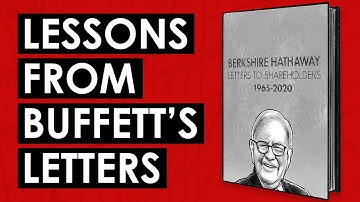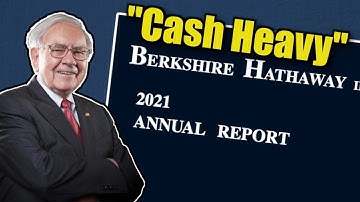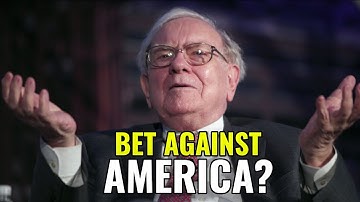Buffett's Letter to Shareholders
What is Buffett's Letter to Shareholders?
Buffett's Letter to Shareholders
Warren Buffett's annual letter to the shareholders of Berkshire Hathaway is a landmark publication in the world of finance and business. It is far more than a standard corporate report; it is an annual masterclass in investing, management, and rational thinking, penned by one of the world's most successful investors.
| Attribute | Details |
|---|---|
| Author | Warren E. Buffett |
| Publisher | Berkshire Hathaway Inc. |
| Publication Date | Annually since 1965 (The modern format began in 1977). Typically released on a Saturday in late February. |
| Genre | Business, Finance, Investing, Annual Report |
| Acclaim | Widely considered essential reading for investors, managers, and students of business. It is a primary text in many university finance courses and is revered for its educational value, clarity, and timeless wisdom. |
Description
For decades, Warren Buffett has used his annual letter as a direct channel to communicate with his "partners" – the shareholders of Berkshire Hathaway. These letters are famous for their unique blend of humility, wit, and profound insight. Buffett eschews complex jargon in favor of clear, simple prose and folksy analogies (like "Mr. Market" and "economic moats") to explain sophisticated financial concepts, making them accessible to everyone.
Each letter typically covers:
- Berkshire's Financial Performance: A transparent review of the company's operating results, including both its successes and failures.
- Investment Philosophy: Reinforcement of the core tenets of value investing, emphasizing a long-term perspective, a margin of safety, and the importance of understanding the businesses you own.
- Commentary on the Economy: Buffett's broad perspective on the state of the American and global economy, interest rates, and market behavior.
- Corporate Governance and Management: Lessons on rational capital allocation, the importance of ethical and talented managers, and the principles behind Berkshire's decentralized structure.
- Life Lessons: Often, the letters contain wisdom that extends beyond finance, touching on topics like rationality, patience, and the importance of trust.
Key Themes & Concepts
The letters have introduced and popularized several fundamental investing concepts:
- Circle of Competence: Only invest in businesses you can understand.
- Mr. Market: An allegory for the stock market's irrational mood swings, which should be viewed as a servant to be exploited, not a guide to be followed.
- Economic Moats: The durable competitive advantages that protect a business from competitors, ensuring long-term profitability.
- Intrinsic Value: The "true" underlying value of a business, which is the central focus for a value investor, rather than its fluctuating stock price.
- The Institutional Imperative: The tendency for organizations to mindlessly imitate their peers, often with irrational and counterproductive results.
Legacy and Influence
While not a traditional book that wins literary awards, the collected letters of Warren Buffett are arguably one of the most influential business texts ever written. They have educated generations of investors and set a gold standard for corporate transparency and communication. The letters are a gift to the public—a free, world-class education in business and investing, delivered annually with unmatched clarity and integrity. For anyone looking to understand how to think about markets, evaluate businesses, and build long-term wealth, there is no better place to start.
View questions by category
Core Investment Philosophy
Exploring the cornerstones of Buffett's investment system, such as margin of safety, circle of competence, and the relationship between value and growth.
Company Analysis & Valuation
A deep dive into Buffett's methods for assessing a company's intrinsic value, interpreting financial statements, and identifying economic moats.
Classic Investment Case Studies
Reviewing Berkshire's major investments, from Coca-Cola to Apple, and analyzing the logic and lessons behind these decisions.
Corporate Management & Governance
Focusing on Buffett's unique insights into management integrity, board responsibilities, executive compensation, and corporate acquisitions.
Deconstructing Berkshire Hathaway
Analyzing Berkshire's unique corporate culture, decentralized management model, and the engine role of its insurance float.
Investment Psychology & Market Insights
Revealing how Buffett capitalizes on Mr. Market's irrationality and exploring the key role of emotional control and rationality in investing.
Reflection, Critiques & Future Outlook
Examining the challenges to Buffett's investment strategy, his acknowledged mistakes, and the future applicability of the Berkshire model.
Videos for Buffett's Letter to Shareholders

Warren Buffett's letter to shareholders, plus a look at his history of investing
Yahoo Finance

IMPORTANT Lessons from Warren Buffett's Shareholder Letters (TIP521)
We Study Billionaires

5 Lessons From Warren Buffett’s New Letter to Shareholders
Dividend Data

How Warren Buffett approaches writing Berkshire Hathaway's letter to shareholders
CNBC Television

Warren Buffett's 2025 Annual Berkshire Hathaway Shareholder Letter - Full Audio
The Market Rocket

Warren Buffett's letter to shareholders breakdown and changes to the Berkshire annual meeting
Yahoo Finance

Ep. 1 - Investment Philosophies of Buffett and Munger | Learn how to pick a stock
Zerodha Varsity

Berkshire Hathaway Letter To Shareholders 2025
Shubham Agrawal

バフェット・パートナーシップ・レターズ(ウォーレン・バフェット著)
The Swedish Investor

Warren Buffett vs Cash | Berkshire Hathaway
Montu Regal

Warren Buffett Letter To Shareholders 2021
Nick Daly

Warren Buffett's letter to shareholders
KMTV 3 News Now

Our Favorite Quotes From Warren Buffett's Shareholder Letters
Bloomberg Originals

Top 5 Lessons from Warren Buffett's Letter to Shareholders
Stephen Spicer, CFP

Warren Buffett's letter to shareholders: Key Highlights | #investor#WarrenBuffett
Business Today

Warren Buffett's 1977 Letter to Berkshire Shareholders - Animated
RichReads

▶ Buffett’s Letter to Shareholders in 6 Minutes (2021 Berkshire Hathaway)
Investing with Kurt

Warren Buffett's 2023 Annual Letter to Shareholders
Nick Daly

Warren Buffett's Annual Letter to Shareholders (2021)
New Money
How to Get $FAQ Rewards
We are seeking contributions from many people to reach 100 million questions. We will provide $FAQ token rewards to all contributors
- 1. Ask questions to earn $FAQ rewards
- 2. Provide API_KEY to earn $FAQ rewards
- 3. Random drops of $FAQ rewards when browsing questions
 How has Warren Buffett's 'circle of competence' expanded over time? From textile mills to Apple, is he breaking his own rules or redefining them?
How has Warren Buffett's 'circle of competence' expanded over time? From textile mills to Apple, is he breaking his own rules or redefining them?